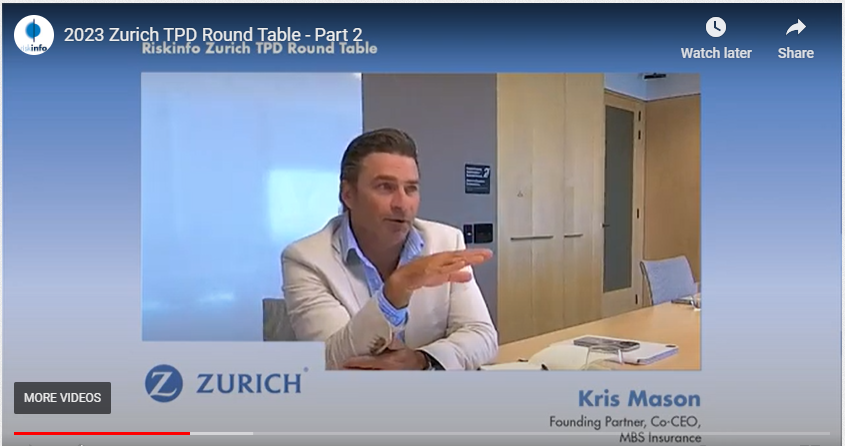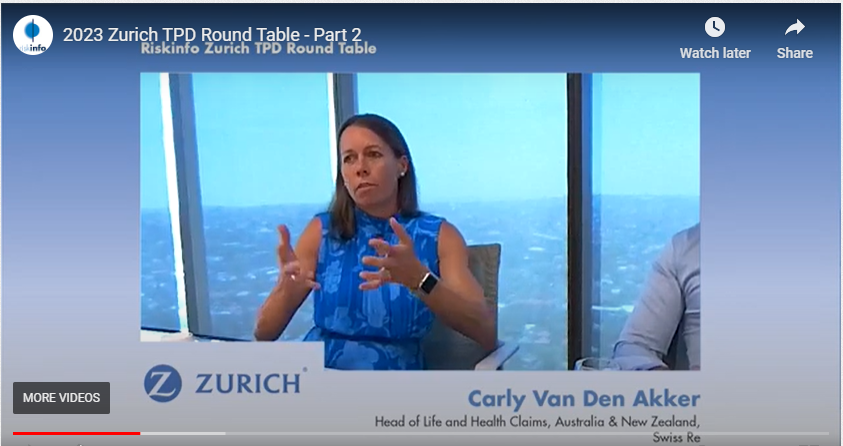There was strong reader interest in our story highlighting that the growing challenge of assessing whether TPD claims are permanent is one of the critical factors driving discussion around the future of the TPD product offer in Australia, including the prospect of instalment benefit payments…
The growing challenge of assessing whether TPD claims are permanent is one of the critical factors driving discussion around the future of the TPD product offer in Australia.
This fundamentally-important element was debated by a panel of industry peers at the Riskinfo TPD Round Table event in December, at which several important points were considered.
Permanency
One of the key issues for insurers in 2024 and beyond revolves around how to assess ‘permanency’ at claim time, which has historically been mostly objective, such as when considering physical and musculo-skeletal conditions requiring x-rays, ultrasound and MRI technology. But the prevalence of subjectivity in TPD assessment is increasing in line with the ever-increasing volume of claims related to conditions such as chronic fatigue, depression and other mental health-related events and conditions.
Subjective considerations when assessing such TPD claims include the extent of the resilience (or its lack) within the claimant, the seriousness of the reported episode(s) and the subjective medical diagnosis of the ongoing nature of the condition.
Incremental TPD Benefits?
These issues are giving rise in turn to suggestions as to what product modifications might be possible in order to address the current challenge associated with the lack of objective criteria on which the claims manager is forced to base their assessment of the TPD claim before them.
One suggestion involves the payment of incremental TPD benefits, rather than a single lump sum. While moving away from the lump sum structure, the TPD Round Table panel reflected this might be one piece in a complex solution puzzle that may be worthy of consideration. Such a move would deliver a proportional benefit to the claimant for what might be (subjectively) determined to be an episodic total disability event without it necessarily being permanent.
This discussion connects with related issues such as the potentially changing role of the TPD proposition in Australia, especially since the late 1980s, when income protection insurance was introduced into the Australian market.
To hear how this conversation unfolds, take the following link to the panel’s discussion on the issues surrounding the objective and subjective assessment of permanency when assessing TPD claims…








Hold the horses!
What’s not being discussed in this debate is what is the breakup between TPD claims for advised/underwritten business AND TPD claims for default cover in industry super funds, all of which comes out of the same Statutory #1 Fund.
I argue we have to have those figures because I suggest the default cover TPD claims are currently distorting the arguments coming from the insurers. There is a simple answer, which of course won’t be popular – all TPD business in industry super funds should be the subject of underwriting at policy inception. Only then are we on a level playing field in terms of consumer benefit. As Malcolm Fraser once said – “there is no such thing as a free lunch”
But your article also raises the issue of what is now clearly subjective decision-making by TPD claims assessors. It seems to me that most insurers are extremely sensitive to some of the findings that came out of Hayne and some of the absolutely outrageous ramblings than the consumer groups constantly make about TPD being “rubbish insurance” .
Let us go back to paying the client a TPD claim on an objective basis against the relevant TPD definition you see specialist medical opinion, and then let us see what improvements might occur.
Otherwise TPD cover, in any type of definition, will become unaffordable, regardless whether it is paid in instalments or not!
And of course it’s not helped when AFCA make decisions to pay “compensation” which happens to equal a TPD benefit that has been refused by an insurer, purely because the insurer could not prove that an offer of a “review ” of a spinal exclusion on a TPD benefit had been made over the nearly 20 years life of the policy.
This Federal Court decision hopefully will be subject to an appeal, but if the decision is left to stand, the outcome on this case (Teagle v Resolution Life) will have severe impacts for this industry
Comments are closed.